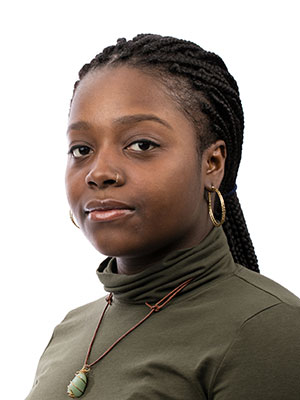
“I heard people saying, ‘I’m the district attorney of this place,’ ‘I’m a lawyer at this organization,’ ‘I’m the head of law enforcement in this city,’” she says. “Here I am, an Amherst sophomore, in the same room with these important people. It was a little intimidating. But I knew from day one that we would be able to effect good and needed change.”
Williams was appointed by Gov. Charlie Baker (R-Mass.) to be a part of the 17-person task force he revived in November 2017 in response to a rise in anti-Semitic incidents across New England. Charged with advising Baker on issues relating to the prevalence, deterrence and prevention of and support for victims of hate crimes, the group promotes coordination among law enforcement agencies in order to improve the investigation and prosecution of such acts; encourages and assists agencies in the safe reporting of them; and helps analyze and publicize hate crime reports. The team has also been asked to develop best practices for school districts looking to make hate crime education a part of the curriculum.
At its inception, the task force divided itself into sub-groups focused on education and law enforcement; Williams chose to be part of the education group. Her responsibility is to represent the perspective of and advocate for youth in the state of Massachusetts.
The role of advocate is not new for Williams. Long passionate about social justice and equality, she has been active at Amherst in activities that reflect that dedication. Williams is studying in Cuba this semester—and continuing to participate in task-force meetings remotely—but when she was on campus she was involved in the Women’s and Gender Center and in LGBTQ advocacy, and she started an affinity group for black and Latinx students. Her other Amherst activities include membership in Dancing and Stepping at Amherst College, the women’s rugby team, the Resurrect Gospel Choir and the Black Student Union.
“Being a part of the task force has absolutely deepened my commitment to social justice issues,” she says.
Her dedication has certainly been on display during task-force meetings, says fellow member and City of Northampton Police Chief Jody Kasper. “When the Task Force was first created, it was clear that members brought varied experiences and expertise to the table, including D.J.,” said Kasper. “Very early on we were able to talk and I learned a bit about her background, and her connection to Amherst College and Western Massachusetts. She is a critical thinker who makes valuable contributions to group discussions. She is also really committed to the mission of the Task Force and shares her thoughtful and insightful input during meetings.”
The media values her opinions too. In a recent article in the Boston Globe Williams said that while law enforcement measures are important in the battle against hate crimes, education is a highly powerful tool. She explains now: “Because hate is a learned behavior, it’s a mistake to focus solely on after-the-fact measures. We’d only be addressing the symptoms and the results of an illness—not on the sickness itself.”
“That’s why it’s important to start the conversation about tolerance and acceptance early, with children, in the schools,” Williams insists. “In doing so, we’re creating different, more peaceful and loving learned behaviors.”